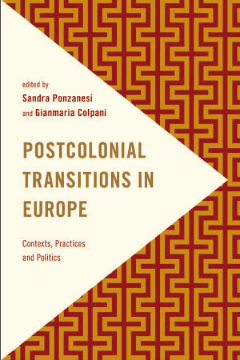
Additional Information
Book Details
Abstract
Is the notion of postcolonial Europe an oxymoron? How do colonial pasts inform the emergence of new subjectivities and political frontiers in contemporary Europe? Postcolonial Transitions in Europe explores these questions from different theoretical, geopolitical and media perspectives.
Drawing from the interdisciplinary tools of postcolonial critique, this book contests the idea that Europe developed within clear-cut geographical boundaries. It examines how experiences of colonialism and imperialism continue to be constitutive of the European space and of the very idea of Europe. By approaching Europe as a complex political space, the chapters investigate topical concerns around its politics of inclusion and exclusion towards migrants, asylum seekers and refugees, as well as its take on internal conflicts, transitions and cosmopolitan imaginaries.
With a foreword by Paul Gilroy
Postcolonial Transitions in Europe is the bold attempt to unmask the colonial logic viciously at work, still today, within Europe itself. When crises and austerity have become system of governance; when neo-nationalisms, neo-racisms, and the policing of borders are trumpeted as the only alternative, this book has the courage to offer a new sense of orientation for a continent adrift.
Roberto Dainotto, author of Europe (in Theory)
Sandra Ponzanesi is Professor of Gender and Postcolonial Studies at the Department of Media and Culture Studies, Utrecht University.
Gianmaria Colpani is a PhD candidate of Philosophy and Gender Studies at the University of Verona and Utrecht University.
With a foreword by Paul Gilroy, Professor of American and English Literature at King's College London
Postcolonial Transitions in Europe is an extremely important and timely intervention into academic and public debates around the continent’s identity, its past, present and future. The volume offers rigorous and original scholarship that draws on a broad range of sources from popular culture to migration policies and ethnographic research. Its authors demonstrate how the concept of postcoloniality can be mobilized to productively address legacies of violence and inequality that have so far remained woefully undertheorized, while also pointing to more equitable ways for Europe to define itself and its place in the world. The accessible and thought-provoking interrogation of issues that will only become more pressing in the future make this an indispensible resource for anyone interested in what a postcolonial Europe might be.
Fatima El-Tayeb, Professor of Literature, University of California San Diego, author of European Others
This beautiful collection of essays, presenting and surpassing the state of the art in postcolonial thinking about Europe’s troubled identity in the early 21st Century, makes it possible for us to understand the combined effects of cycles now meeting with their simultaneous ends: eurocentrism, nation-building and collective identification through stable borders. Clearly Europe is the Post-Colony par excellence. It could have invented a new, equalitarian Cosmopolitanism. Or will it? The authors ask this burning question through investigation and imagination.
Etienne Balibar, author of We, the People of Europe?
